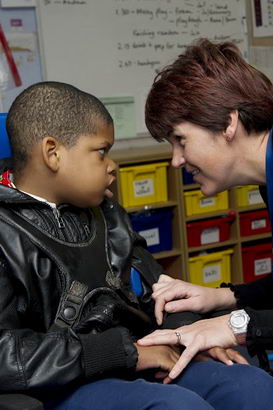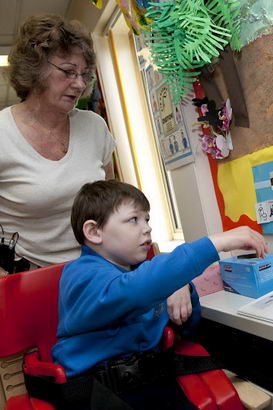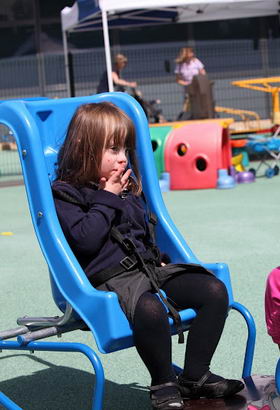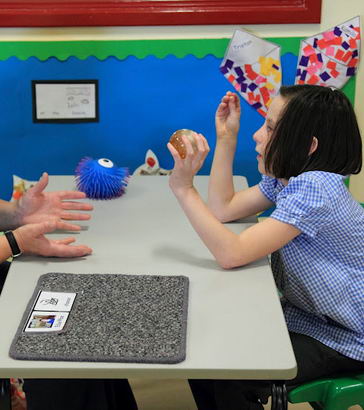
Given that the nature of learning for those with PMLD can never be guaranteed to be either linear or developmental (Barber and Goldbart, 1998; Ware, 2003; Imray, 2005; Hewett, 2006; Routes for Learning, 2006, Aird, 2009; Lacey, 2010; Carpenter, 2010), there is a considerable challenge to our teaching methodology, which is generally based on subject-driven, target-centred, skills-based curriculum models.
Skills-based teaching recognises that certain skills need to be acquired by practice over time. A footballer will hone the skill of taking penalties by regular practice. It is not necessary for this to take place within the context of a game, just as it may not be necessary for a learner to eat lunch to practise holding a spoon; the skill can be transferred to the relevant situation once it has been acquired. But for learners who are poor at generalising skills we run the risk of disassociating the skill from the practice.

Skills based learning is usually assessed using SMART targets: those that are achievable within a set period of time. Teachers also have to decide the number of targets appropriate for each learner: too many makes it both very difficult to recall when recording and runs the real risk of compartmentalising learning. Too few puts tremendous pressure on success and might easily lead to concentrating on the immediate targets (for the term, say).
There may be a myriad of other progresses in all sorts of other areas that are not recorded because the recorders are concentrating on pre-set targets.

There is an assumption that just as all learners must benefit from subject-based learning, so all learners must benefit
from SMART targets. Attainable and relevant may be
reasonable; specific, measurable and timely may not. One commentator argues that learning
at this very early cognitively developmental level does not occur by laying one skill upon another to form a building block,
but is 'scatological', coming from all experiences in the holistic manner of neuro-typical children learning through play.
(Hewett, 2006). During pre-school play groups, teachers will not have specific targets
for children to achieve. They offer opportunities to play, tools to facilitate play, other children in the vicinity to play
with; they will ladder and scaffold with children who might
find it difficult and stand back with children who take to it easily; they will help to resolve difficulties and give problem
solving and thinking opportunities to children. They will do all of these things – but they will not set SMART targets!

Penny Lacey advocates SCRUFFY targets – Student led, Creative, Relevant, Unspecified, Fun, For Youngsters (Lacey, 2010). She also remarks that pupils with PMLD are 'poor consumers of SMART targets'.
Although there is definitely a place for skills based teaching, for pupils with PMLD, it should probably only be practised when the class receives one-to-one teaching and learning opportunities.
Nonetheless, it may cover areas such as eating and drinking, noticing stimuli, responding consistently to one stimulus, contingency
responding, contingency awareness, tracking, object permanence or selecting from two or
more items.

Aird, R. (2009) A commentary on the National Strategies DCSF Special Education Needs/Learning Difficulties and Disabilities (SEN/LDD) Progression Guidance Project 2008-09. The SLD Experience. Issue 53.
Barber, M. and Goldbart, J. (1998) Accounting for Learning and Failure to Learn in People with Profound and Multiple Learning Disabilities in Lacey, P. and Ouvry, C. People with Profound and Multiple Learning Disabilities. London. David Fulton.
Hewett, D. (2006) The most important and complicated learning: that's what play is for! ICAN. Talking Point, March 2006
Imray, P. (2005) Moving Towards Simple, Understandable and Workable Definitions of SLD and PMLD. The SLD Experience. Issue 42.
Lacey, P. (2010) Smart and Scruffy Targets. The SLD Experience. Issue 57.
Routes for Learning (2006). Qualification and Curriculum Group. Welsh Department of Education. Cardiff
Ware, J. (2003) Creating a Responsive Environment for People with Profound and Multiple Learning Difficulties. London. David Fulton.